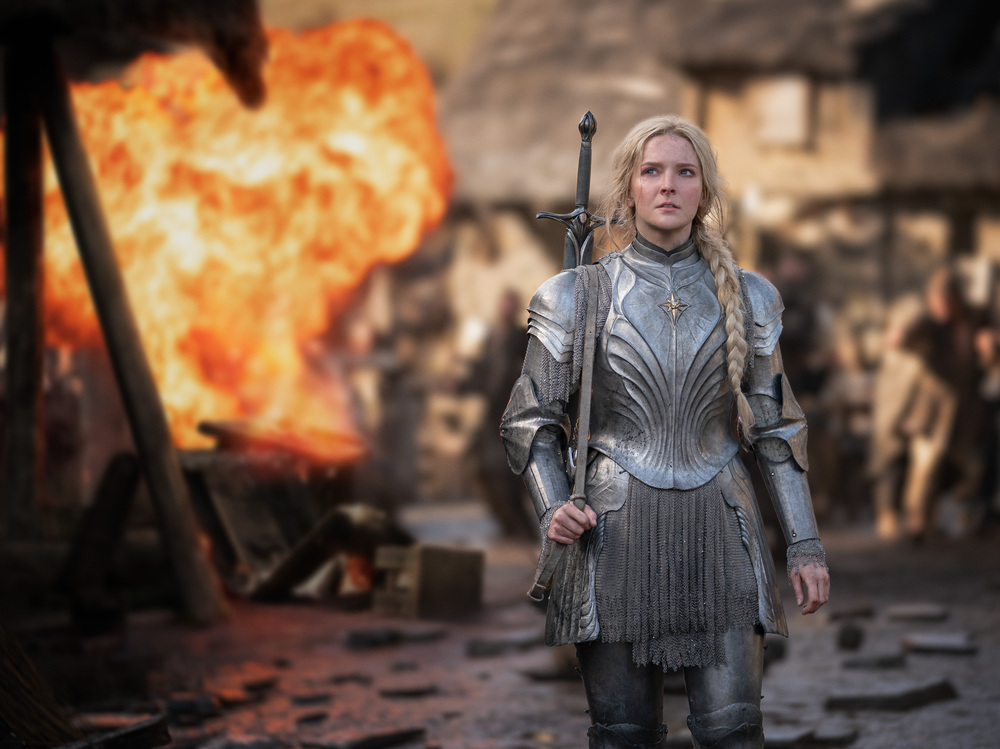
It's a big moment for fans of high fantasy, who currently have several big budget TV series to choose from. But for some, the weeks leading up to the release of Amazon's Lord of the Rings prequel series have meant a mix of excitement – and a little anxiety.
"My main concern was how much is this new version of Lord of the Rings going to incorporate a lot of what makes Game of Thrones Game of Thrones, namely its gratuitous gore and sex scenes. And I'm happy to say that it does not, so I was pleasantly surprised," Rebecca Jennings, who has written about the series for Vox, told me when I asked her what she thought of the show so far.
In The Lord of the Rings: The Rings of Power, the highly-anticipated prequel series set thousands of years before J. R.R. Tolkien's books, there's so far little of the graphic violence and nudity in the opening episodes that Jennings referenced. And viewers are introduced to Middle-earth through the eyes of a woman.
The first voice that viewers hear is the voice of the elven princess Galadriel, played by Morfydd Clark, a familiar character for fans of the Peter Jackson theatrical trilogy (and who provides the opening dialogues of those films, too.)
The Rings of Power trailer
YouTube"Nothing is evil in the beginning, when the world was so young there had not yet been a sunrise," Galadriel says in a voiceover. "But even then, there was light."
In Jackson's trilogy, Galadriel was played by Cate Blanchett, and was something of a wise, stately elder. But this Galadriel is young, vibrant, and convicted — a warrior in her own right.
"I think there is a kind of refreshing simplicity, I would say, about Tolkien's Middle-earth where good is good and evil is evil, and I think that's also reflected in the women on screen," Jennings said. "We know Galadriel from the films but she played a relatively small part in the trilogy, whereas in this series she plays a warrior princess who's kind of intent on avenging her brother's death by Sauron. Clearly she is the one with the main driver of the plot, and she's the one that's leading the battle, leading the action, and leading the tension."

And Clark's Galadriel is not the only female character to take center stage in the first few installments of the series. The cast includes a number of new female characters, including the first female dwarf ever seen in Lord of the Rings – Disa, played by Sophia Nomvete.
Comparisons between The Rings of Power and Game of Thrones are almost inescapable, especially given that HBO's long awaited Game of Thrones prequel, House of the Dragon, arrived on screen at about the same time. And, to be fair, as a devoted fan of both series, there are some similarities between the two, like the use of computer-generated maps in the opening credits, and the way both series follow multiple intersecting characters across the fantasy world.
Game of Thrones was criticized for casual misogyny and normalized, gratuitous sexual violence – even by those like Jennings, and myself, who counted ourselves among the show's fans.
"I was just cringing every time there was a woman on screen because I was waiting for something horrible to happen to her," Jennings said. "It was this kind of tension while watching it that kind of prevented me from fully enjoying it, whereas when I'm watching Lord of the Rings or Rings of Power, I don't have that kind of sense of, 'Oh gosh, what's coming.' Lord of the Rings is a more simple story, it's about good vs. evil. It's not necessarily about these kinds of murky, icky elements of human nature, necessarily that make up Game of Thrones."

Even so, Jennings says that it's too soon to say whether this prequel to Tolkien's saga is a more feminist rendering of Middle-earth and beyond.
"I would say that it is absolutely more inclusive and diverse, but I'm not sure we can say this show is feminist or this show is not. It does pass the Bechdel test, which I'm pretty sure Lord of the Rings doesn't, so that's point one for Rings of Power."







